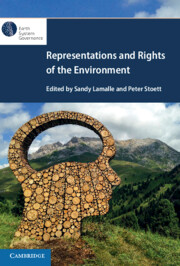Book contents
- Representations and Rights of the Environment
- Series page
- Representations and Rights of the Environment
- Copyright page
- Dedication
- Epigraph
- Contents
- Illustrations
- Tables
- Contributors
- Preface
- Acknowledgements
- 1 An Introduction
- Part I Challenges
- 2 Environmental Humanities
- 3 Decolonising the Dialogue on Climate Change
- 4 Our Relationship with the Land
- 5 A Common Space of Legal Communication
- Part II Recollection
- Part III Perspectives
- Index
- References
3 - Decolonising the Dialogue on Climate Change
Indigenous Knowledges, Legal Orders and Ethics
from Part I - Challenges
Published online by Cambridge University Press: 16 March 2023
- Representations and Rights of the Environment
- Series page
- Representations and Rights of the Environment
- Copyright page
- Dedication
- Epigraph
- Contents
- Illustrations
- Tables
- Contributors
- Preface
- Acknowledgements
- 1 An Introduction
- Part I Challenges
- 2 Environmental Humanities
- 3 Decolonising the Dialogue on Climate Change
- 4 Our Relationship with the Land
- 5 A Common Space of Legal Communication
- Part II Recollection
- Part III Perspectives
- Index
- References
Summary
Indigenous peoples in Canada score far worse on indicators of well-being than the general public due to historical and ongoing processes of colonisation. It is also well recognised that Indigenous peoples are the most impacted and vulnerable populations affected by climate change. Currently proposed climate change ‘solutions’ are derived from the same Western colonial mindset which caused the crisis in the first place, so it is logical that we look for alternative approaches. Indigenous knowledge systems (IKS) have allowed Indigenous peoples to survive centuries of environmental degradation brought about by European colonisation, as well as thrive for millennia. International declarations have specifically recognised the potential of IKS to help alleviate climate and other environmental crises. Indigenous peoples must therefore be enabled to undergo decolonisation processes, so that we may all benefit from the revitalisation of Indigenous ways of relating to the Earth in mutually beneficial ways.
Keywords
- Type
- Chapter
- Information
- Representations and Rights of the Environment , pp. 66 - 86Publisher: Cambridge University PressPrint publication year: 2023
References
- 1
- Cited by



